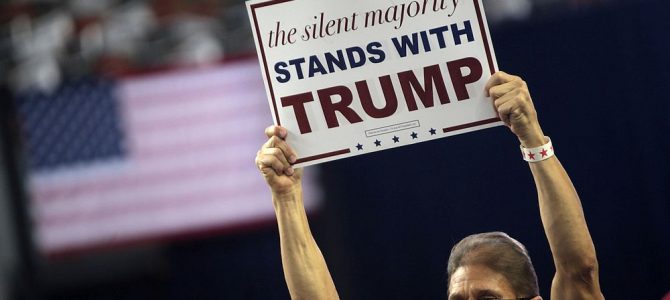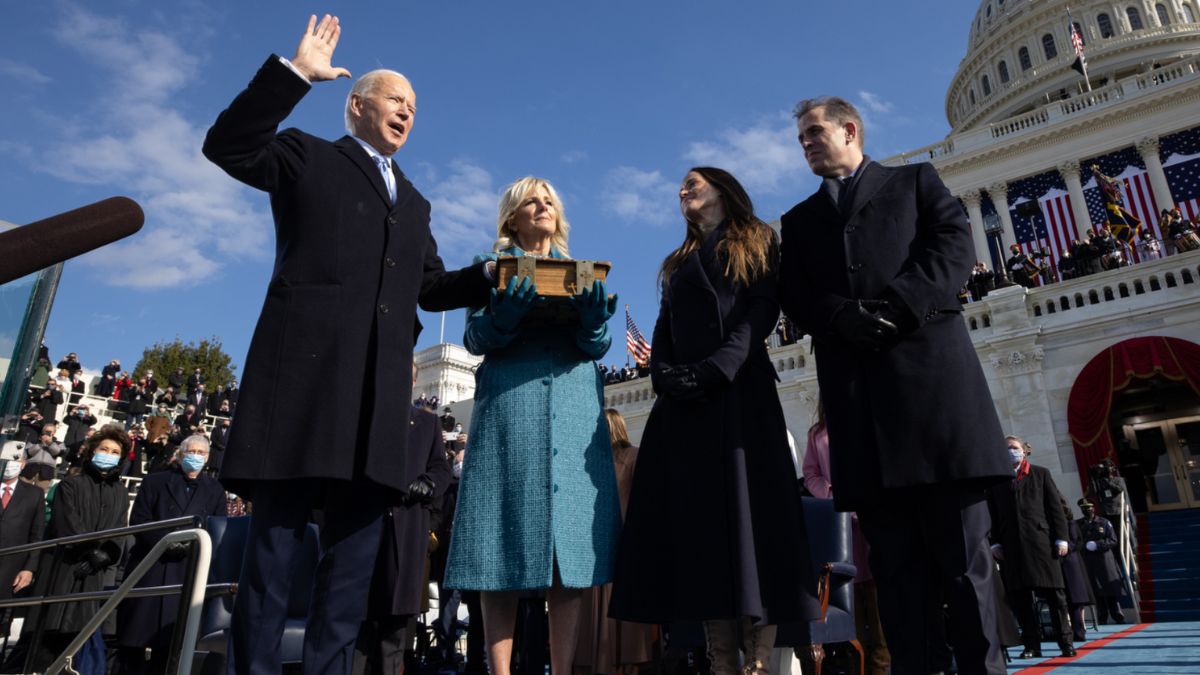
From the pages of The New Criterion, George Nash gives us the ten-thousand-foot view of conservatism since William Buckley. It’s a useful refresher as we consider the possibility of a new conservative coalition. Can Buckley’s intellectual descendants find a way to make peace with the new nationalists? Is there light at the end of this tunnel?
Thus far, most post-election strategizing has focused on “solving” Trumpism by looking for methods to marginalize or appease diehard supporters of Donald Trump. Some hope Trumpism will be thoroughly repudiated at the polls, opening a way for a resurgence of Reaganesque conservatism. Peering past the presidential campaign to consider what’s happening in down-ticket races, these people note that mainstream conservatism still has considerable appeal. Might the Pandora’s Box of populism be re-sealed?
Not everyone favors that option. Some anti-Trump conservatives have called for a “politics of solidarity,” which responds to Trumpian nationalism with a sympathetic shift in policy and rhetoric. Solidarity boosters remind us that Trumpites, even if not numerous enough to forge a viable party, still represent a sizable voting bloc we ignore at our electoral peril. In addition, they regard it as a patriotic duty to show concern for fellow Americans who are struggling in various ways.
Both of these approaches share a common problem. They fail to address the substantive gulf that separates the new populist-nationalists from the Buckleyite conservatives. This isn’t just about class warfare. To a considerable extent, these groups want and value different things. We won’t fix the problem by marginalizing sizable groups of voters, but proclaiming “solidarity” will be equally unhelpful if the underlying disagreements remain unresolved.
The Benefits of Fusionism
What we truly need is a new fusionism. The heirs of William Buckley must find a way to forge a principled alliance with the new nationalists, based on something more than desperation and hatred of Democrats.
Frank Meyer, the author of the original fusionism, was an editor of National Review and a political philosopher. Considering the increasingly fractious relations between Hayekian libertarians and Kirkian traditionalists, he realized a philosophical solution was needed to secure a lasting alliance. Conservatives had already built a pragmatic coalition, founded mainly on their shared opposition to the political left.
Nevertheless, the alliance was endangered by apparently deep disagreement concerning the larger political outlook. Libertarians were strongly fixated on minimizing the role of the state and preserving individual autonomy. Traditionalists were particularly interested in fleshing out the details of the well-lived life, and weren’t as reluctant to enlist the state’s help in realizing their vision. The disagreements between these groups sometimes seemed intractable.
Meyer did more than negotiate a peace treaty between these groups. He helped them to recognize they needed each other, not just at the ballot box, but also in the trenches. For traditionalists that meant recognizing the extent to which state overreach threatened the virtues they prized were threatened. Libertarians came to see how tradition and its fruits functioned as critical bulwarks against Leviathan.
Fusionism was a philosophy that connected the things each group most loved, enabling them to work together for common cause. Libertarians and social conservatives still argue about the good, but their alliance has remained politically fruitful across the decades as a cornerstone of both the conservative movement and the Republican Party.
Is That Possible Any More?
Could a similar feat be accomplished with the Buckleyites and the Trumpites? At first glance the obstacles seem daunting. For one thing, Trumpism is a populist movement, and thus far hasn’t seemed especially amenable to cooperation. A more clubbable strain would need to be developed before Trumpism could be incorporated into a stable coalition.
Assuming that that were possible, more substantive obstacles present themselves. Trumpism strikes discordant notes with literally every significant feature of the older conservative coalition. It shuns foreign involvement and shrugs at long-maintained alliances. “Starving the beast” is a low priority, and free trade is casually dismissed as a concern of the out-of-touch elitist. Nominally the Trump campaign has paid lip service to the pro-life movement, but it’s clear that traditionalist concerns about marriage and religious freedom are back-burner issues at best. Every element of Reaganite conservatism has lost ground with the rise of Trumpism.
These don’t look like promising grounds for negotiation. If we pull back our lens, however, we might find the ingredients for a more fusionist solution, which connects divergent camps on a deeper philosophical level, and re-envisions fractious differences as the grounds for a fruitful kind of diversity.
Finding Common Ground
For conservatives, common ground will probably be found in a shared desire for ordered liberty, the opportunity to engage in honorable work, and to preserve a recognizably American way of life for ourselves and for our children. On that foundation, the internationalist successors of Buckley and the more localist devotees of Trump might find the grounds for fruitful disagreement.
Calling the Buckleyites “internationalist” might seem strange, since conservatives have always supported federalism and an increased reliance on local government. Nevertheless, the Buckley alliance did have a globalist orientation in that its cornerstones were found in globally applicable principles or ideals: free-market economics, classical liberalism, alliance-forging neo-conservatism, and a traditionalism self-consciously rooted in the Western philosophical tradition. Modernity’s discontents, it seems, demand something more idiosyncratic. Some people want a politics that is self-consciously American.
That demand finds echoes all across the world, as modern markets and technology have facilitated material prosperity, but also widespread social dysfunction. Rapidly shifting labor markets make it increasingly difficult to plan for the future, and eroding social structures remove supports that would traditionally help people adapt. Meanwhile, even as some sub-groups struggle, technology ensures all of us can gape at the more-successful, accentuating resentment and demoralization.
It’s easy to recoil at the aggressive self-assertion at the heart of every populist movement, but we should also recognize how deep and endemic these anxieties are to modern life. Reaganite conservatism has fallen short in addressing them. Integrating a self-consciously localist faction into the conservative coalition might help us debate these problems more productively. That in turn might position us to address more effectively the problems of modern alienation.
Finding Balance
At the same time, the achievements of Meyer and Buckley cannot be swept aside. Even were their candidate not so obviously unfit for office, our neo-nationalists would find it difficult to forge a viable party on their nationalist platform. Their disdain for free trade, interventionist foreign policy, and robust traditionalism all speak to a common demand: they want a politics that addresses the anxieties of ordinary Americans more directly.
That’s understandable, but realistically, we do still live in a deeply interconnected world. Conservatives since Buckley have devoted considerable energy to understanding that global complexity in light of certain fundamental principles, and Trumpism hasn’t presented serious evidence those principles are wrong. Without the moderating influence of mainstream conservatives, the new nationalists are prone to stomach-turning tribalism (such as we see in the alt-right) and dangerous naïvete.
Many conservatives (myself among them) have been dismayed by the apparent willingness of our colleagues to cheerlead a movement that seems strikingly similar to other modern populist movements that we once (rightly?) dismissed as aimless victim-mongering. In our view, conservatives ought to be building and preserving great civilizations, not sowing grievances and breaking furniture. The very concept of a “conservative populism” is intrinsically suspect. Isn’t that the province of the Left?
Still, let’s imagine a world in which right-leaning populists struck a more conciliatory tone and engaged mainstream conservatives in constructive dialogue about America’s future. Suppose their sympathizers dropped their aggressively moralistic tone, and instead started looking for substantive common ground with partisans of a more globalist, Buckleyite strain of conservatism. Might the populist influence prove useful in the end?
Although it’s always been an uphill battle, modern conservatism has persisted for half a century now. Over that time, conservatives have done tremendous good for our nation and world. Today, the challenges seem as daunting as ever. Let us hope, for everyone’s sake, that the conservative coalition is not on its last legs.









